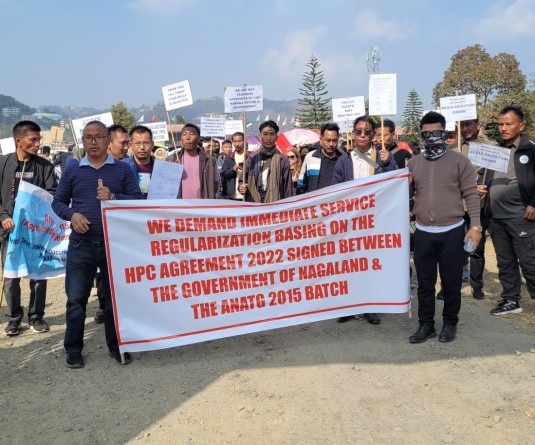
IDUF submits suggestions for amendments to NDPS Act 1985
Kohima, November 5 (MExN): The Indian Drug Users’ Forum (IDUF) along with 58 other organizations submitted a letter to the Director- Narcotics Control, Department of Revenue, Ministry of Finance Government of India (GoI) on November 5, sharing consolidated suggestions for amendments to the Narcotic Drugs and Psychotropic Substances Act, 1985 on behalf of the community of People Who Use Drugs (PWUD).
“As a group of community and civil society organizations having utmost concern for the welfare of drug users, our attention has been drawn to the recent process of the Narcotic Drugs & Psychotropic Substances Act (hereafter referred as NDPS Act) amendment and wanted our voices heard as members of the beneficiary community,” they stated.
They highlighted that a vast majority of the community continue to be criminalized under various sections of the law and further marginalized by society. Many have been traumatized by violence, imprisoned for possession of small quantities of drugs for personal use or coerced to undergo compulsory and often inhuman drug dependence treatment, they observed.
As a result, people who use drugs, especially those who inject drugs, have been isolated and often denied the means to protect themselves from HIV, hepatitis C virus, tuberculosis and other infectious diseases. Against this backdrop, the organizations advocated for a careful re-balancing of policies and for consideration of alternatives to criminalization and incarceration of their peers.
While acknowledging the GoI’s contribution, the organizations also noted that the country’s drug problem remains a common concern, which they said, should be addressed through a multilateral approach through effective and increased cooperation between all relevant departments, sectors and the drug users.
As such, the organizations forwarded their recommendations on Friday.
Recognize drug use as health disorder
The organizations suggested a move to recognize drug use disorders as a complex, multifactorial health disorder characterized by a chronic and relapsing nature with social causes and consequences that can be prevented and treated through, inter alia, effective scientific evidence-based drug treatment, care and rehabilitation programmes, including community-based programmes.
They also recommended strengthening the capacity for aftercare for and the rehabilitation, recovery and social reintegration of individuals through assistance for effective reintegration into the labour market and other support services. “This is to reiterate that drug use disorders ought to be treated as a public health concern rather than a criminal law issue,” they stated.
Decriminalization
The principle of ‘innocent until proven guilty’ does not apply to the NDPS Act, the organizations pointed out. Opining that people do not lose their basic human rights simply because they use drugs, they also sought for decriminalization.
In this regard, they pitched for a review of the NDPS Act towards complete decriminalization of drug users with minor, non-violent drug offenses – use, consumption, possession, and petty sale – and strengthen health and social-sector alternatives to criminal sanctions.
Option for voluntary treatment
The organizations further suggested provision of making voluntary decisions when opting to seek treatment during the trial in the judiciary system. “We are of the opinion that forced treatment does not work and therefore, should not be imposed, but that the person should be given to participate voluntarily, while seeking drug treatments,” they added.
Quantity threshold
They also recommended increasing the ‘quantity threshold’ of drug/s in possession for personal consumption keeping in mind the impurity of drugs resulting in increase in average daily dose of a user to minimize withdrawals which in most cases can be debilitating, and sometimes fatal.
They also recommended that only weight of the controlled salt should be considered while determining quantity.
“We call for the Act to give more attention in increasing investment in health and respect for human rights and dignity of PWUD which will lead to greater gains towards health, social and criminal justice system,” they added.
In view of these, the organizations requested amendments/revision in sections 27, 27A, 64A and 71 of the NDPS Act so that people who use drugs are neither criminalised nor penalised and have access to voluntary health, treatment and harm reduction services.
In addition, they reiterated that terms such as ‘addict’ are stigmatizing, derogatory, misleading and discriminatory in itself.
“It deters people like families, friends and the concern individual person from seeking treatment,” they stated and requested removal of the word ‘addict’ from the contents of the Act in total, and replace it with the universally used term ‘people who use drugs’ or PWUD.
Assuring strong commitment and offering their alliance to organize and work with the government towards ensuring the wellbeing of PWUDs in the country, the organizations reiterated that dignity, respect, and access to health are non-negotiable basic rights for all people who use drugs.
“Nothing about us, without us,” they wrote, as they sought the government’s consideration and insertion of the suggestions into the NDPS Act.





